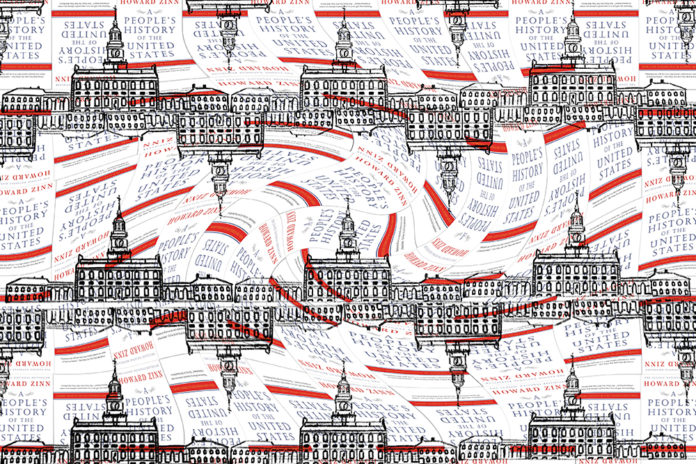In seventh grade, my humanities teacher dropped Howard Zinn’s “A People’s History of the United States” on my desk. This light read taught me that Columbus wasn’t that great of a guy, slaves rebelled against the values of a U.S. capitalist system and manifest destiny was only possible by killing millions of Native Americans and Mexicans. Even though history was, and still is, my favorite subject, I didn’t understand why it had to be so negative and why we had to be so critical.
Last Sunday, the New York Times published an article on an ongoing debate in Michigan public middle schools about whether its social studies curricula should describe the U.S. government as a republic or democracy. The meaning of these two words links to partisanship. “Democracy” is more popular among liberals and implies that we should expect our government to hold values of liberty, equality and diversity. “Republic” is more popular among conservatives, and it insinuates that we should focus on a close reading of the Constitution and that the government’s triumphs outweigh its sins.
According to the article, many Michigan conservatives prefer to call the U.S. government a “constitutional republic.” They claim that their argument for this term is historical, not partisan. However, it is clear that their political ideology contributes to an incomplete historical narrative of the U.S. government. Politically, the U.S. is a republic because, in our indirect democracy, the Constitution carries a lot of weight. Yet, from a historical perspective, it’s imperative to teach the U.S. government as a democracy. We need to be critical of U.S. history in order to understand our mistakes in the past and not repeat them in the future.
When we describe the U.S. government as a democracy, we highlight the voices of marginalized communities. Long before I began looking at archival documents in college, my social studies teachers in elementary school made sure we could put ourselves in the shoes of everyday people through writing historical journal entries. We had a project where we had to write and create a journal, using tea-stained parchment paper, from the perspective of a European immigrant. I wrote from the perspective of a girl named Rosetta who was from Italy and moved to the Lower East Side of Manhattan. This taught me from a young age that historical events affect everyone, and that history needs to tell stories about people other than politicians or intellectuals. To a large extent, the immigration policies on Ellis Island from the late 19th century to the early 20th century made the U.S. an inclusive nation. The policies back then should inform our current immigration policies today. History should always breed empathy.
U.S. history needs to look beyond what the Constitution says and analyze the consequences of Supreme Court decisions. In the critical time period between the Civil War Reconstruction and the Civil Rights Movement, many Supreme Court cases had profound effects. Congress passed the 14th Amendment in 1868, which claimed that no one was denied “equal protection of the laws,” but Plessy v. Ferguson in 1896 twisted this rhetoric and claimed that black and white men could be “separate but equal.” It wasn’t until the Brown v. Board of Education case 58 years later that the Supreme Court declared segregation in public schools unconstitutional. But there are aspects of school segregation that still exist today. Trying to conceal historical narratives of racial oppression is like trying to conceal a gnarly zit; it doesn’t work. In order to change the U.S. government’s ugly past, we need to be cognizant of it.
Some may say I’m unpatriotic to call U.S. government a democracy instead of a republic. Even though I set high expectations for the U.S., it doesn’t mean that I believe the country is inherently bad. I’m happy to live in a country where people are able to be critical of their government without fear of censorship. I’m not trying to silence those who believe the Constitution or individual rights are important, but children in their formative years need to learn that it’s okay to challenge what we know about our past –– not just take it at face value.
Even though it’s important to understand how the U.S. government works and what it’s done well, history is more complex than that; it’s imperative that children learn about issues such as immigration laws or African American rights in order to understand how they affect many people today. In addition, children should learn about history from a bottom-up perspective, which means examining documents from ordinary people affected by larger historical events. It’s also more entertaining to learn about history this way. People are funny, quirky and, for the most part, honest. If history curricula are going to change for the better, we need to teach it through people, not politics.
Esmé Epstein is a sophomore history major. She can be reached at eepstein@oxy.edu.
![]()































